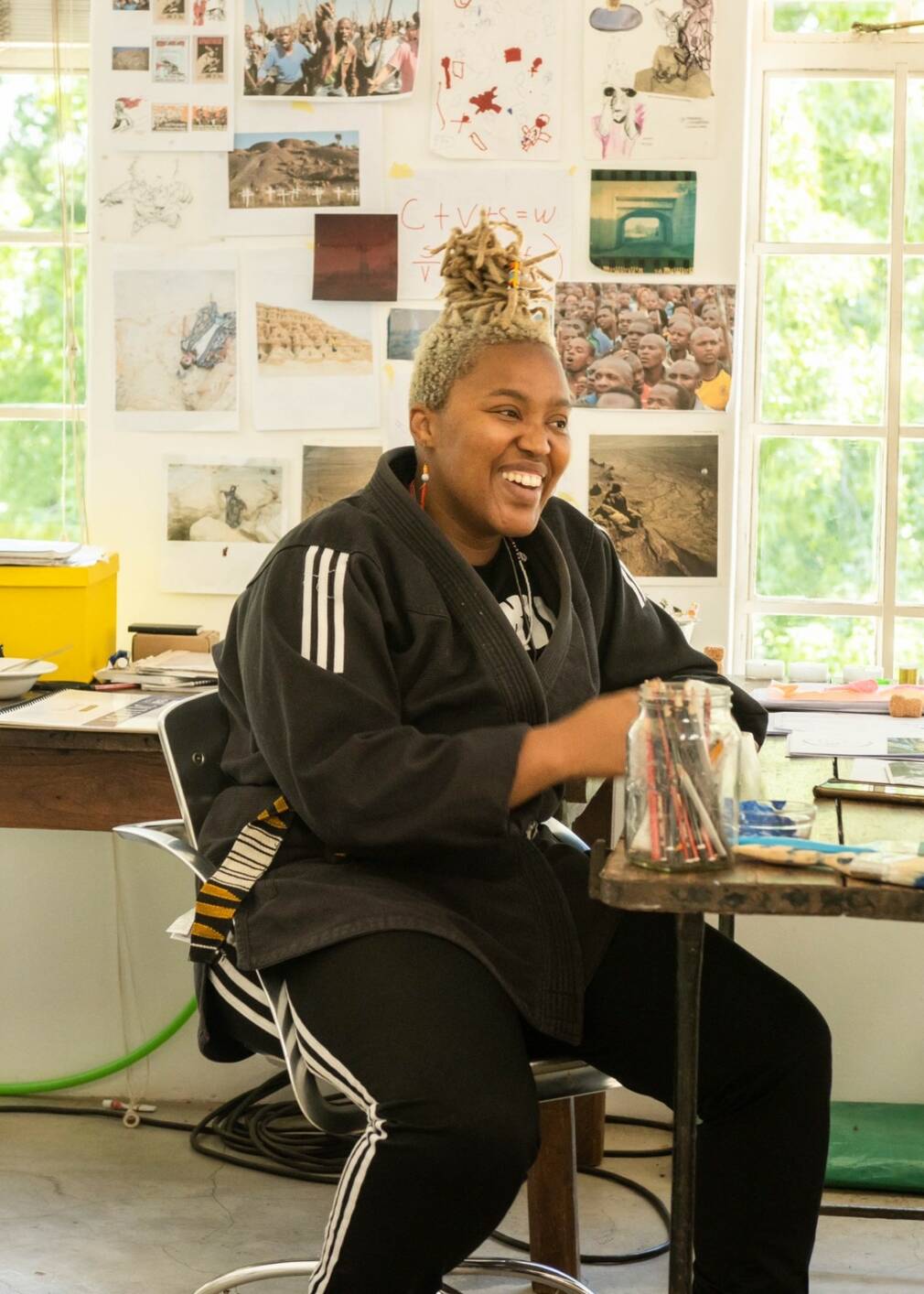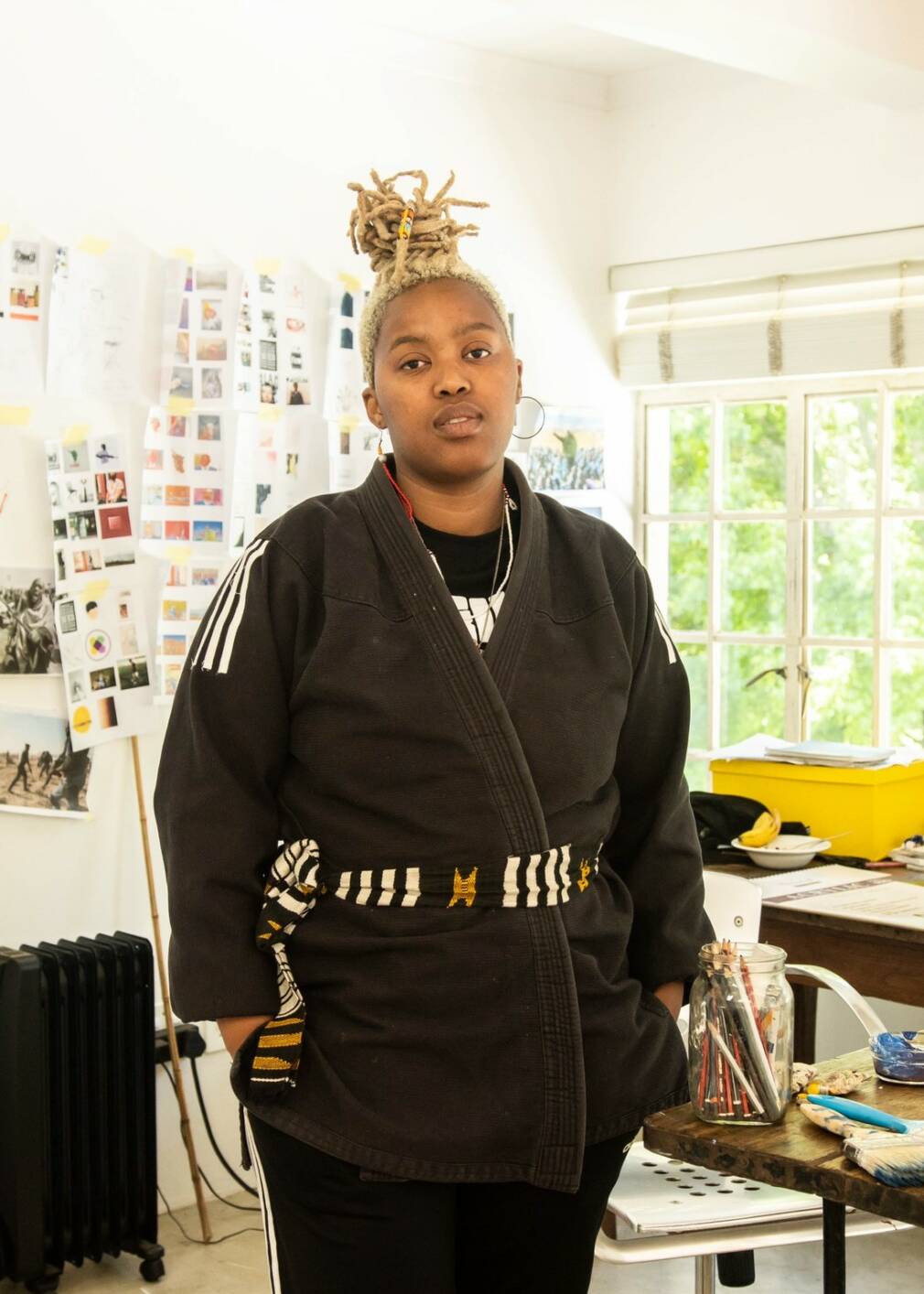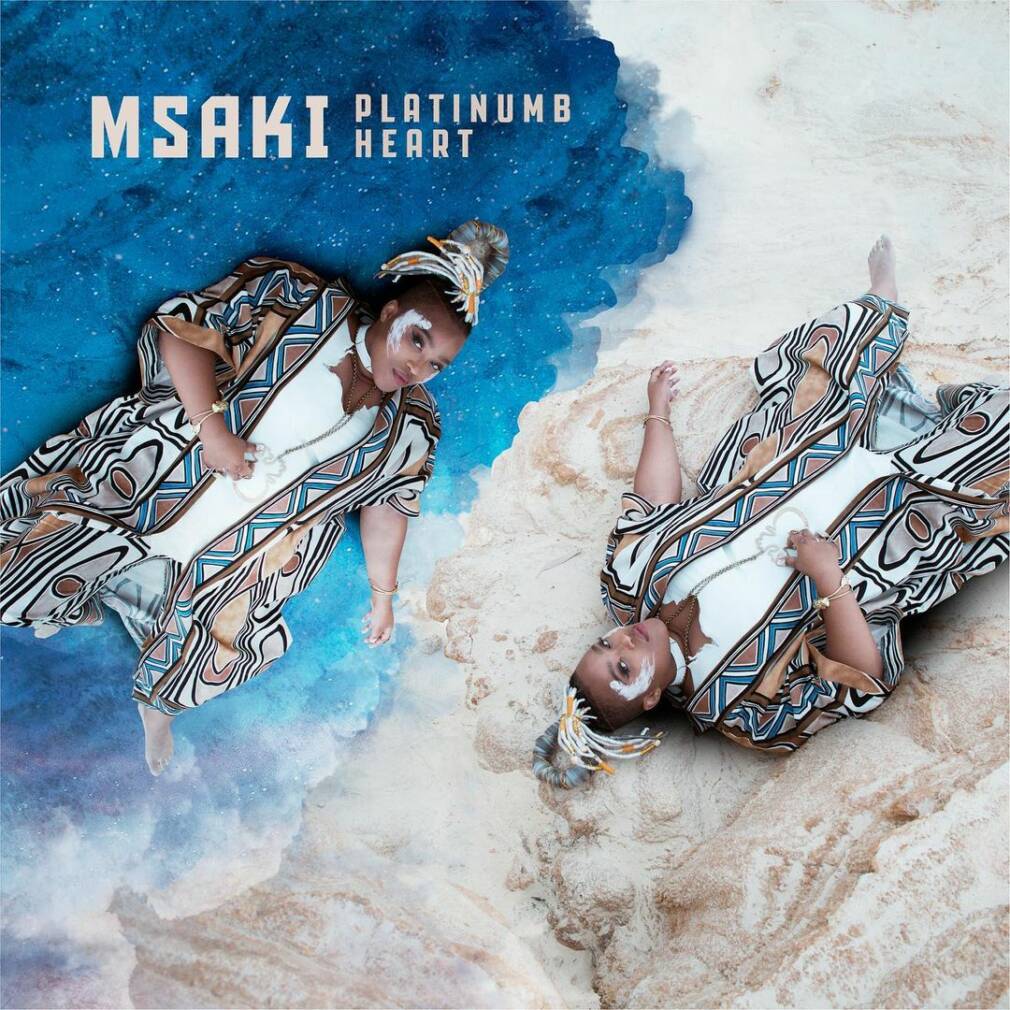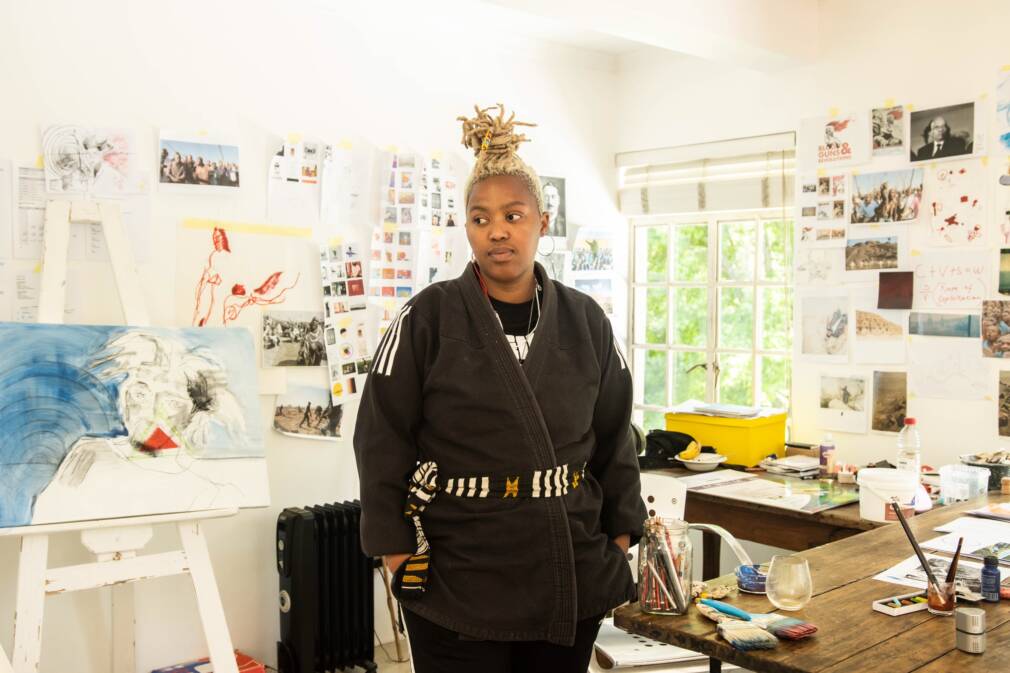We met Msaki at Nirox Sculpture Parc, one hour away from Johannesburg. The place breathes art: between the paintings, the stages, the garden sculptures and the recording equipment, Msaki seems to be in her element. The singer-songwriter is a frequent user of the venue herself, for artist residencies and exhibitions. “This place’s got a lot of personality”, she smiles as she makes us tour the huge main house. “What I like about it is that it’s idea-oriented. They don’t care about how many exhibitions I’ve done before – this is what I wanna do, this is what it looks like, and they are cool with it. They’re trying to make space for different people.”
Msaki, born Asanda Lusaseni Mvana in the Eastern Cape, is one of the “different people”. A fine-art university dropout, a fully multi-disciplinary artist dabbling in electronic and acoustic music and plastic art and an independent label owner, her vision and expression seem to always be multi-dimensional. She is also one of the artists that comes to mind when speaking about “indie” music in South Africa: as she says it herself, “composing with guitar and voice kinda lands you into the indie space”. Sonically speaking, her debut EP Nal’ithemba and then album Zaneliza: How the Water Moves were in that acoustic vein.
But beware: in the space Msaki’s in, behind the sweet arrangements and the gentle guitar, being indie is a fight. A fight for having a voice, for staying financially afloat, for having decent representation. This is partly why she founded ALTBLK>>, a creative space offering tailored support to independent and alternative artists. “It stands for Alternative Black, and that little arrow is for continua, just picking up on the concept of ‘a luta continua’. The industry is Black and White in South Africa. The white indie musicians or alternative musicians got a better PR game going on, a better collective representation. As an alternative African live musician, you’re immediately niche and if you don’t fit into the categories, it’s over for you. The understanding of the whole value chain of music, I try to package it for my friends with ALTBLK. It’s a support system: making sure that they all have work, and if they don’t that they have sustenance”.
However, this doesn’t mean that Msaki embraces and comforts herself in an “alternative” spot: “I struggle with labels”, she smiles. Indeed, when she released the pure house track “Fetch Your Life” with Prince Kaybee in 2019, Msaki got as mainstream as one can be, winning the House Record of the Year at the Dance Music Awards SA. With an acoustic and rock background, how did she become this house superstar vocalist? “Mostly by accident”, she laughs. “I had no plans on becoming a house vocalist. But one night, I had a show with my band at a theatre, and my friend Mobi Dixon came to see me. He took my guitar and put it in his booth for me to go with him to the studio! We recorded ‘Love Colour Spin’, I did it in one take and I went home. The next thing, we had a hit on the radio. Obviously, what that did is that it made a lot of other DJs look for me. Revolution Brothers, Oskido… Black Coffee started looking for me, and I was still living in the Eastern Cape, absolutely uninterested in this world! I love SA House so much. I feel like with SA jazz, it has got such a distinct place in the world. It’s so easy to define.”
Her new album Platinumb Heart couldn’t escape the latest South African house craze: amapiano. “I ran away from amapiano a bit, just because I’m naturally scared of things that are trending”, she says. “But musically, I’ve always been interested in what they do with the drum. There’s actually a song where I put the log drum underneath an orchestra.” The project features heavyweights of the movement such as Major League Djz, Abidoza, and Kabza De Small and Focalistic on the soft “Mntakababa”. “I met Focalistic at Kabza’s studio. I was writing a song about going home in December and trying to bring something back from my labour in Johannesburg, wherever it is that you are a migrant labourer. I’m so uncool that I was literally singing about bringing bricks home and Kabza was like ‘No Msaki, not the bricks…’ (laughs). And Foca was like “I’ll bring you some swag, and money to wipe your tears’.”

“I think Kabza is an incredible producer, we actually jammed as if I was with my band! He played the piano, and he was intentional about me bringing my guitar. He was just so open about a new sound of amapiano, my guitar is so present in that song! It’s carrying the melody, and that shows that we’re open to form new genres, write new ways of making electronic music. The purists will be pissed off but we don’t really care, I’m unfortunately the worst nightmare for purists. If you’re attached to any kind of genre in its purest form, you will hate me because I’m gonna mess with it in all imaginable ways.”
Amapiano didn’t exist when Msaki started working on Platinumb Heart. The whole process started after a contemporary South African tragedy taking place in the country’s North-West province in 2012. The Marikana massacre was the killing of 34 miners by the South African Police Service, after a massive strike. It was the most lethal use of force by South African security forces against civilians since 1976. “Platinum is the mineral, but I added the ‘b’ to reference the state of emotional numbness, non-feeling, cold, unpleasant”, Msaki explains. “The first song I wrote for the album was ‘Blood Guns and Revolution’. That’s when I knew it’s probably gonna be a protest album. It was referencing what had happened on the platinum mines of Marikana, where miners were shot for a bit of living wage. It sparked a series of other protest songs: ‘At Stake’, ‘Status’… Other songs that just were processing my rage, my disappointment in this country. Now the oppressor is who? I was really just jolted out of my rainbow nation haze. That’s why I have to put that album out. Art becomes the final courtroom where you can still ask the hard questions. Like 4000 rounds of bullets…? But nobody premeditated it? That still doesn’t make sense to me in a democracy.”

To process this tragedy, to make something beautiful out of the ugliest, the singer has decided to use the format of a double album, one being fully acoustic and the other one electronic. However, despite a sonic difference, both parts express the same anger… and love. “The two part album was just because there’s a lot of things being split down in the middle with me”, she shrugs. “I’m a singer songwriter, live musician, electronic dance musician and then I had an album of protest songs, an album of love songs… I didn’t want to split them in the middle. So when I decided to group it, I was like ‘let’s mix the protest and the love songs a bit’.” Even the love songs, as light and cheerful as they sound, subtly carry the weight of Msaki’s will for change. “Songs like ‘No Rainbow’, ‘Status’, ‘Chem Trails’ reference a lot of disturbing things, even being about love. ‘Chem Trails’ is about falling in love, and I’m referencing the violence of putting chemicals in our environment, the same way that if you are falling in love, it’s a violent chemical reaction. The dopamine is attacking you, you can’t eat, you can’t sleep… It’s an agony, but I’m talking about a polluted universe – which is the body. I do think that people have the capacity to dance to some really serious stuff. But there’s definitely more fight in the acoustic part. Definitely more acid, more anger, more yearning for solutions.”
The yearning for solution Msaki expresses is once again multidimensional, going beyond the music. Our conversation ends up drifting about fighting through music, but also fighting for music, in a country where it is probably not recognized at its highest value. “They’ve shown us that they have the littlest, lowest regard for art in this country”, Msaki sighs. “During covid, they squandered our elder’s funds, and the funds for cultural workers were stolen and embezzled. It disappeared, evacuated through corruption as usual. They call us the golden economy – the irony of it! That is so close to the truth if they knew that our artists are gemstones. This is a highly exportable, extremely valuable industry, and if you had supported it and treated it the way they should have… Historically, any civilized society held artists in high regard. It raises the living quality of the whole population when artists are highly regarded. We are feeling this disregard, living it. And to practice and to make like we do becomes a form of activism.”
Platinum Heart Open and Beating by Msaki, out on all platforms.





